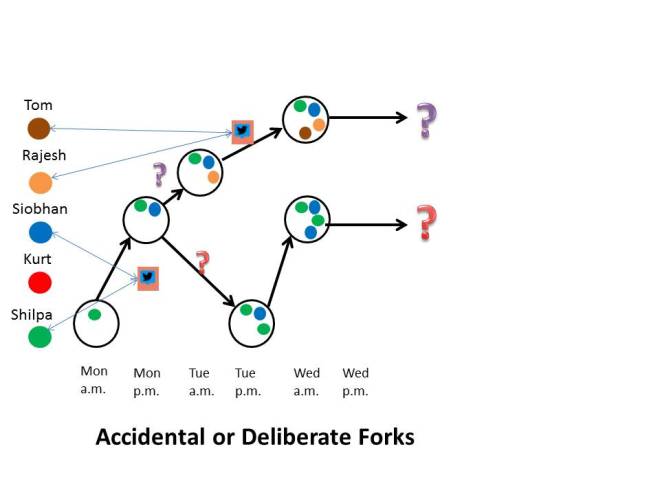Reflection of Fedwiki Happening
If you have read my last two posts Dazzled by diversity and Layers of meaning at #Fedwikihappening, you will know that I was one of the privileged people who took part in a Fedwiki Happening, led by Mike Caulfield, and inspired/ supported / birthed by Ward Cunningham. It has been an amazing experience. I reflected before the happening (from reading about fedwiki), I reflected during it as I played and puzzled and learned (about what I could do and what I didn’t know). I am reflecting now, and I am sure will still be reflecting in the months to come so please don’t taken anything written here as other than provisional.
The first thing to say is that I have learned more about some very interesting topics posted, edited and linked by happening participants. Here’s a flavour – if you track across the versions of the page, you can picture the development of the ideas http://frances.uk.fedwikihappening.net/maha.uk.fedwikihappening.net/illuminating-a-path/catherine.uk.fedwikihappening.net/illuminating-a-path/journal.hapgood.net/illuminating-a-path/kate.au.fedwikihappening.net/illuminating-a-path.
I would like to reflect further on the enticing possibilities of intimate and rich collaborative writing with Fedwiki but in this post I’ll share my concerns about the uncertainty that newbies may experience.
In one of the daily newsletters, Mike shared a published exchange between students (not his class) where the punch line was ” <name> DO UR OWN PAGE”. The moral that Mike (quite rightly) drew out of this was that much of students’ experiences of wiki was more like a lego bricks placed side by side rather than true collaboration where their bricks made a magnificent structure. Well of course that is true, but I am a Brit and I couldn’t help thinking about that underdog student. What if they were frustrated by their lack of understanding of the wiki technology, and that student who edited their page was really painful outside class, and was now trying to squash them in the wiki. So I can imagine that in Mike’s classes where he knows and listens to students, and gives them lots of support and opportunities to vent that could be solved but out in the wild, learners could think they have to put up or shut up – so they turn off.
I like diagrams so I decided to invent a development process for a post, offer two interpretations, share it at #fedwiki and see what people say. Here is what I have just posted at #fedwiki – please don’t take it too seriously.
Two Tales of Two Forks

Note: This is not based on the history of a particular post but is sparked by some observations of forking at fedwikihappening. No doubt the tales contain inaccuracies but are intended to open up discussion of the social and technical practices around forking. These tales are two different interpretations of the development of the post shown in the diagram.
-
A tale of accidental forking of ideas
Shilpa posted about bug-eyed monsters on Monday morning. Siobhan noticed the post as she was very interested in bug-eyed monsters and immediately tweeted Shilpa (whom she knew from the Bug-Eyed Monster Society) to let her know she was forking her post and adding to it.
On Tuesday morning Rajesh noticed Siobhan’s edit of the post . He forked it and contacted his mate Tom via Twitter as they had a mutual interest in bug-eyed monsters. They tweeted back and forth, then met for coffee on Wednesday morning. On Wednesday afternoon, Tom forked the post and made substantial edits. Tom and Rajesh felt that they had really built on the original ideas from Shilpa and Siobhan.
Meanwhile Shilpa saw Siobhan’s post (as she but not Rajesh was in her neighbourhood), forked it and added to it, letting Siobhan know what she had done, and Siobhan responded by forking and editing on Wednesday morning. On Wednesday afternoon, Shilpa checked the Conversation Club, rather than her usual approach of Recent Changes in her neighbourhood. She was really surprised that the new and improved version seemed to be missing Siobhan’s and her recent additions. Kurt scratched his head.
-
A tale of independent development of ideas ( and a little bit of angst)
Shilpa posted about bug-eyed monsters on Monday morning. Siobhan noticed the post as she was very interested in bug-eyed monsters and immediately tweeted Shilpa (whom she knew from the Bug-Eyed Monster Society) to let her know she was forking her post and adding to it.
On Tuesday morning Rajesh noticed Siobhan’s edit of the post . He forked it and contacted his mate Tom via Twitter as they had a mutual interest in bug-eyed monsters. They had already decided not to join the Bug-Eyed Monster Society as they really disagreed with their hypotheses on the reasons for the bugginess of the monsters’ eyes. They tweeted back and forth, then met for coffee on Wednesday morning. On Wednesday afternoon, Tom forked the post and made substantial edits to correct what they saw as the mistakes that Shilpa and Siobhan had made.
Meanwhile Shilpa saw Siobhan’s post (as she but not Rajesh was in her neighbourhood), forked it and added to it, letting Siobhan know what she had done, and Siobhan responded by forking and editing.
On Wednesday afternoon, Shilpa checked the Conversation Club, rather than her usual approach of Recent Changes in her neighbourhood. She was really surprised that the newest version of the post was so radically different from the one she had been working. She wondered what to do next. Kurt sighed.
Some observations
We could write another version of this tale where Kurt invited Shilpa, Siobhan, Rajesh and Tom to a Google Hangout , and they came up with ideas on how to restructure the post into a series of linked posts that displayed the alternative theories on bug-eyed monsters. But, but, but … Kurt was an old hand, the others were new and were still learning about forking, journal and the implicaions of neighbourhoods. Also, the technology is quite new, operating across servers in different continents and time zones. In a context where there is socio-technical unpredictability, maybe we need Repair Strategies.
Comments
I would love comments, here or at #fedwiki on Twitter or on the post at #fedwiki itself. I will try to collate what I have learned and repost at all three places.
